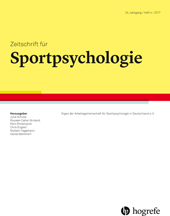Rumination im Zusammenhang mit dem Erreichen selbst gesetzter Ziele bei leistungssportlich-orientierten Schwimmern
Abstract
Zusammenfassung. Die Studie untersucht den Zusammenhang zwischen Rumination und der persönlichen Zielerreichung bei Leistungssportlern. Im Rahmen einer Längsschnittuntersuchung, haben 44 Schwimmer_innen an einer Onlinebefragung mit vier Messzeitpunkten während der Wettkampfsaison 2014/15 teilgenommen. Der Online-Fragebogen enthielt neben der deutschen Version des Rumination Response Style Questionnaires (RSQ-D; Kühner, Huffziger & Nolen-Hoeksema, 2007), Fragen zu persönlichen Zielen und biographische sowie sportbezogene Fragen. Unter Berücksichtigung der individuellen Angaben zur Zielerreichung am Ende der Wettkampfsaison, wurden die Sportler_innen einer Realisierungsgruppe (n = 17) oder Vergleichsgruppe (n = 27) zugeordnet. Mittels multivarianter Varianzanalyse (MANOVA) wurde getestet, ob globale Unterschiede in der Rumination zu Beginn und am Ende der Wettkampfsaison zwischen den Gruppen bestehen. Sportler_innen, welche ihr individuelles Ziel erreicht haben, weisen im Vergleich zu denjenigen, die ihre Ziele nicht erreicht haben, niedrigere Ruminationswerte auf. Die Ergebnisse legen nahe, dass Rumination im Kontext der Zielerreichung auftritt und ein relevanter Faktor für den Leistungssport darstellen könnte.
Abstract. We investigated the level of rumination of elite athletes in relation to their personal goal achievement. Within the framework of a longitudinal analysis, 44 elite swimmers completed online questionnaires at four times during the competitive season of 2014/2015 including the German version of the Response Styles Questionnaire (RSQ-D; Kühner, Huffziger, & Nolen-Hoeksema, 2007), personal athletic goals, biographical, and sports-related questions. Regarding the reported individual goal achievement at the end of the season, participants were assigned to a realization (n = 17) or comparison group (n = 27). We applied a multivariate analysis of variance (MANOVA) to test overall differences in rumination between both groups at the beginning and at the end of the competitive season. Athletes who fulfilled their goals had lower rumination scores compared with athletes who did not. This suggests that rumination occurs during processes of goal achievement and that rumination might be a relevant factor in competitive sports.
Literatur
(1986). A review of paradoxical performance effects: Choking under pressure in sports and mental tests. European Journal of Social Psychology, 16, 361–383. https://doi.org/10.1002/ejsp.2420160405
(1973). Eta-squared and partial eta-squared in fixed factor ANOVA designs. Educational and Psychological Measurement, 33 (1), 107–112. https://doi.org/10.1177/001316447303300111
(2002). A qualitative analysis of catastrophic performances and the associated thoughts, feelings, and emotions. The Sport Psychologist, 16 (1), 1–19.
(2007). Response Styles Questionnaire: RSQ-D. Göttingen: Hogrefe.
(1996).
Some ruminative thoughts . In R. S. Wyer, Jr.Ed., Ruminative Thoughts: Advances in Social Cognition (Vol. 9, pp. 1–47). New York, NY: Psychology Press. https://doi.org/10.4324/9780203763513(2004). Anger rumination: An antecedent of athlete aggression? Psychology of Sport and Exercise, 5, 279–289.
(2002). Self-focused attention and negative affect: A meta-analysis. Psychological Bulletin, 128, 638–662.
(2005). Predicting psychological distress in college students: The role of rumination and stress. Journal of Clinical Psychology, 61, 447–460. https://doi.org/10.1002/jclp.20021
(1991). Responses to depression and their effects on the duration of depressive episodes. Journal of Abnormal Psychology, 100, 569–582. https://doi.org/10.1037/0021-843X.100.4.569
(2004).
The response styles theory . In C. PapageorgiouA. WellsEds., Depressive Rumination. Nature, Theory, and Treatment (pp. 107–123). Chichester, UK: Wiley.(2008). Rethinking rumination. Perspectives on Psychological Science, 3, 400–424. https://doi.org/10.1111/j.1745-6924.2008.00088.x
(2013). Assessing treatments used to reduce rumination and/or worry: A systematic review. Clinical Psychology Review, 33, 996–1009. https://doi.org/10.1016/j.cpr.2013.08.004
(2016). Rumination and performance in dynamic, team sport. Frontiers in Psychology, 6:2016. https://doi.org/10.3389/fpsyg.2015.02016
(2002). Mood, Rumination, and Mood Awareness in the Athletic Performance of Collegiate Tennis Players. North American Journal of Psychology, 4 (3), 457–468.
(2009). A roadmap to rumination: A review of the definition, assessment, and conceptualization of this multifaceted construct. Clinical Psychology Review, 29 (2), 116–128. https://doi.org/10.1016/j.cpr.2008.10.003
(2003). Rumination reconsidered: A psychometric analysis. Cognitive Therapy and Research, 27, 247–259.
(2008). Constructive and unconstructive repetitive thought. Psychological Bulletin, 134, 163–206. https://doi.org/ 10.1037/0033-2909.134.2.163



